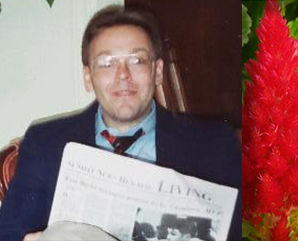
Mary | The Morganton Years
One way to introduce Mary is by her occupation. Mary was the librarian at the state psychiatric hospital in Morganton, NC. Another way would be to introduce her by what she did for a living. Living is one of Mary’s specialties because she had outlived all her family. While having no family may make one quite sad and lonely, it led Mary to become very, very wealthy. When I met Mary, I was taken aback not by her wealth, for she hid her wealth well. I was taken aback by the way she looked. I suppose it helps a story to describe someone by the way they look, but such an introduction seems shallow at best.
The prophet Isaiah once introduced us to someone, saying “He was…like a root out of dry ground; he had no form or majesty that we should look at him; nothing in his appearance that we should desire him.” (Isaiah 53:2 NRSV) I suspect the prophet introduced this character by looks to show how shallow we are, and that beauty is more than skin deep. I also believe that beauty is a word that describes salvation, defines a shepherd, and defines the words of Psalm 23, the cadence, the eternal. This is where I am heading, I didn’t know it when I met Mary.

Bobbitt | The Morganton Years
Bobbitt is the daughter of my dear Bob. He also worked at the psychiatric hospital in Morganton. It was Bob, who introduced me to Mary on the front steps of her home, the very place where a shallow description of Mary was formed. She was “…like a root out of dry ground…”
Mary stood on those front steps one afternoon, and it caused one of Bobbitt’s friends to announce to the rest of the seven-year-old girls, “Let’s walk on the other side of the street, because a witch lives there.” The declaration was followed by a finger point. Bobbitt followed the finger to its target and exclaimed, “That’s no witch. That’s my friend Mary.” Bobbitt ran through the gate, up the steps, and gave Mary the embrace of God. If I were to describe Bobbitt to you, I would lead with this story of what Bobbitt did for a living. (I was honored to conduct her wedding in 2010.)

Mary | The Morganton Years
What Mary did for a living was one of her specialties, which leads me to the moment in a Burke County courtroom when Mary had just won her case against a husband and wife who had argued before the court that they were the rightful heirs of a farm that was owned by Mary’s uncle. Mary had in her possession a will that said otherwise. This husband and wife told of how deeply they cared for Mary’s uncle while they were in charge of keeping up said uncle’s land. They cared so deeply, they argued, that the uncle rewrote his will, and the property was rightly theirs. But as I said, Mary had won the case.
The couple trashed the home; but as they were moving out, Mary drove up the driveway. She gave them the papers that handed over the home that they had just trashed, the land and the money in the estate. Mary said, “Here! I was going to give this to you all along, but then you did what you did. I just had to prove that you were liars!”
If I were to introduce you to Mary, I would say that she is the place where justice and grace meet. That is a strangely beautiful place.

Bob | The Morganton Years
Bob is a dear friend who is as gentle and friendly as they come. He is the one that introduced me to Mary, Bobbitt, and story upon story of chuckling miracles and wonders that look a lot like people.
When I was an Associate Pastor in Morganton, I would occasionally join Bob for lunch at the psychiatric hospital. I would see things there that might cause me to note that I have a fair share of good days.
One good Fall day Bob and I took my canoe up to the dam on the Catawba River. Bob’s mother lived there on the river. After a fine lunch, which included fresh muscadines, Bob and I put into the river with two fishing poles, a tackle box, and a six pack of beer and headed down the mighty Catawba. The Catawba isn’t mighty unless they release water from the dam. That day they had opened the sluice gates. Our initial voyage was swift and fast; I would say about forty-seven seconds before the waves from the rapids had sunk our boat. The water was cold enough to take your breath away. We managed to get to the shore. The river took our tackle box and a six pack of beer downstream. We started out again. Our second voyage was swift and fast, lasting about one minute and forty-seven seconds. When we were once again on land, we realized that the mighty Catawba claimed a fishing pole and some items of clothing that had been taken off to dry. It was then that Bob took the remaining fishing pole out of the canoe and threw it into the river. “What are you doing?” I exclaimed. “You don’t get it, do you?” he said, “The river god must be appeased.” There may be a story in Morganton about a half-naked preacher who was drying out on the banks of the Catawba, just past Judge’s Barbecue. Don’t believe it!

Harold | The Morganton Years
Across the street from Bob was a 1967 ranch-style home that came equipped with a Marine Corps flag and a Marine. The Marine had served on the USS Indianapolis during World II. History tells us that the Indianapolis was hit and sunk by Japanese torpedoes. Of the twelve hundred men on board, about nine hundred made it into the water. When the men were rescued four days later, three hundred seventeen remained. One of the men rescued was the Marine that lived in the house across the street from Bob. One summer day Bob and I were sitting on the front porch, listening to Harold share what it was like to hold onto a floating fragment while hearing the screams of his shipmates being devoured by sharks. Harold told the story as if it had happened last Thursday.
I went with Bob to visit Harold because, according to Bob, Harold had cancer and may or may not have needed a pastor. Over the months and days Harold tried to out swim cancer. He was one tough Marine, but the disease made him a walking skeleton. On one visit when Bob dropped off something or other that Harold needed, he asked if Bob would put his shoes on his feet. Harold sat on the edge of his bed while Bob got down on his knees, touched one boney ankle after the other and tied his shoes. When the second bow was nearly complete, Bob heard the Marine say, “I love you.”
So it is that when I see a Marine Corps flag, I think of a front porch filled with sacrifice. Also when I hear the story of Jesus on his knees while washing the feet of his disciples, I remember the one who said, “I love you.”